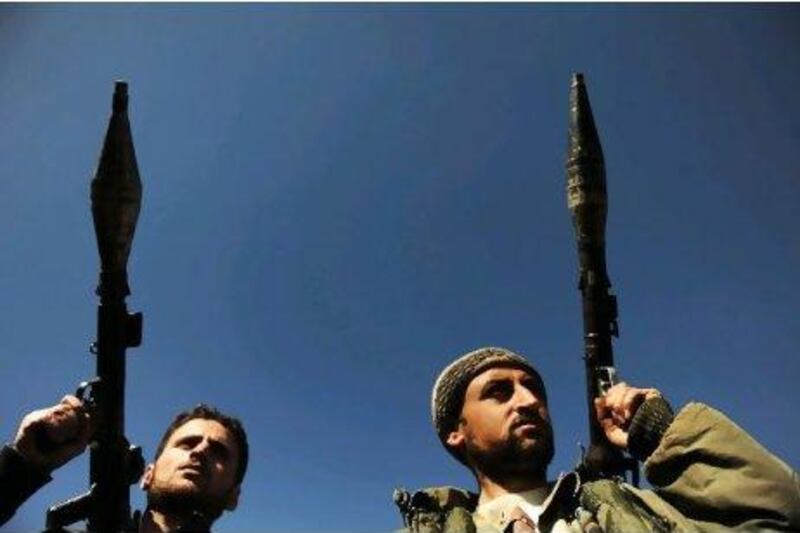BEIRUT // Business has never been so brisk for Abu Jihad.
His phone rings almost non-stop, and he can barely keep up with the demand for his goods.
The war next door in Syria has been good for the Lebanese arms dealer, and the clamour from his phone promises it is going to get even better.
As the fighting in Syria escalates and pressure grows on the international community to provide the means for Syrians to repel the onslaught by government forces, his rocket-propelled grenades and AK-47 assault rifles become more precious commodities by the day.
Asked where the weapons are bound, Abu Jihad, who asked that his real name not be used, placed his hands over his eyes in a display of mock ignorance.
Then he says: "Everyone knows where the weapons are going - to the Jaish Al Hurr [Free Syrian Army].
"At the end of the day, we are trying to make money and to look after our families … I say, just give me the money and take what you want. No problem."
A year ago, an RPG went for US$1,000 (Dh3,670), now it's $2,000. AK-47s have jumped from $1,500 to $2,300.
Technically, it is illegal in Lebanon to sell such weapons, but in a country that suffered through a 15-year civil war that ended in 1990 and still is afflicted by sectarian clashes, stocks are easy to come by.
For the Free Syrian Army, that is good news.
Unable to defect from government army ranks with much more than small weapons, members of the rebel force fighting to depose Bashar Al Assad as president are using donations from Syrians abroad to buy guns and ammunition from neighbouring countries such as Lebanon and Turkey.
"It's natural that when there's armed conflict they're going to try to buy weapons in the country next door. I am selling so much," said Abu Jihad, who is in his forties.
He has several arms depots. At one of his stores in a residential neighbourhood in Beirut, he glances around cautiously before opening the metal doors to a dingy room with blue walls.
Inside the small storage room, AK-47s and RPG launchers are propped against the walls. Rocket-propelled grenades are laid in rows on the floor, beside bayonets and camouflage combat belts. Bullets are spread out on a workbench at the back of the room, opposite a cabinet with small drawers full of other ammunition and ordnance.
"Business is booming," he says, apparently intending no pun.
Abu Jihad does not sell directly to armed Syrian opposition groups, but to a series of middle men who move the weapons to Lebanon's border with Syria and then across to the rebels.
Others not involved in the uprising are also looking to Lebanon for weapons to protect themselves, he says, as the situation in Syria becomes increasingly unpredictable and dangerous.
Several thousand people have died in the year-long uprising and the government's attempt to crush it. Damascus blames the violence on foreign-backed, armed extremist groups.
"We are really close to seeing this military intervention as the only solution," Basma Kodmani, an official with the opposition Syrian National Council, said recently. "There are two evils: military intervention or protracted civil war."
Nevertheless, there are those in the opposition who remain strongly opposed to foreign military intervention, as well as the armed revolt.
Some Syrian opposition activists and soldiers who have defected have downplayed the volume of weapons coming from Lebanon into Syria, apparently in an effort to minimise the country's role in the affairs of its neighbour and prevent any further friction in the historically fraught ties between Beirut and Damascus.
One former officer who fled his unit last year and joined Al Farouq Battalion of the Free Syrian Army said most of the weapons used by the rebels are stolen from government forces.
"The main source is from inside Syria," said the man, who now goes by the name of Omar Al Homsi. "Mostly we get our weapons from attacks on the Syrian army. It is not easy to get weapons from Lebanon because there are mines and more soldiers from both the Syrian army and Lebanese army and military intelligence along the border now."
The Lebanese and Syrian armies have stepped up patrols along the frontier.
But while weapons and other items such as satellite phones and cameras used by activists to document the uprising are crossing the border one way, those who can are arriving from the opposite direction.
There are thousands of Syrian refugees in Lebanon, particularly in the north. When possible, people injured in the violence are shuttled into Lebanon for medical treatment.
Propped up on a bed at a Tripoli hospital, Ibrahim, 11, said he was hit in the back by a bullet when government forces opened fire on his house in the Syrian town of Al Qusayr, just over the border.
"I hope someone will shoot Bashar like they shot me," he said.
Lebanon is watching anxiously as Syria deteriorates.
Although Syrian troops were withdrawn in 2005 after a 29-year presence in the country, Damascus continues to wield political influence over its smaller neighbour.
Lebanon is largely split between groups who still support the Syrianregime, including the Shiite Hizbollah and some of its allies in the governing March 8 bloc.
Last week, Hizbollah's secretary-general, Hassan Nasrallah, accused the opposition March 14 alliance, which supports Syrian opposition calls for Mr Al Assad to step down, of funding and arming Syrian rebels.
The Lebanese government has pledged to stay out of the crisis, which it sees as the only way to protect its own stability.
zconstantine@thenational.ae





